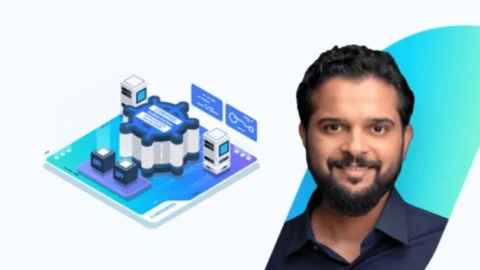
Copy this code and use at checkout
82% Off Kubernetes Certified Application Developer (CKAD) with Tests Udemy coupon
Expires: No Expires
Submitted: 4 months ago
I. Course Overview and Purpose
The course is designed for individuals seeking to achieve the Kubernetes Certified Application Developer (CKAD) certification. Its primary goal is to equip students with the knowledge and practical skills necessary to “Design and Deploy applications on Kubernetes Cluster” and “Develop Cloud First Applications.” It caters to System Administrators, Application Developers, and anyone looking to get certified in Kubernetes.
II. Core Curriculum and Learning Objectives
The curriculum is comprehensive, covering a wide range of essential Kubernetes concepts and practical applications. Key learning outcomes include:
- Kubernetes Certification Preparation: Directly targets the CKAD exam.
- Application Deployment and Design: Focuses on designing and deploying cloud-native applications on Kubernetes.
- Security: Covers securing Kubernetes clusters using “Secrets and Network Policies.”
- Job Management: Teaches how to “Create and Schedule Jobs in Kubernetes.”
- Persistent Storage: Explains how to “Create and Configure Persistent Volumes.”
- Application Health and Resilience: Addresses “Readiness and Liveness Probes” for application health monitoring.
- Troubleshooting: Provides skills to “Troubleshoot Applications Deployed using Logs.”
- Application Lifecycle Management: Covers “Upgrade and Rollback Applications deployed on Kubernetes.”
- Advanced Topics (as per updates): The course has evolved to include topics such as “Build, define, and modify container images,” “Authentication, Authorization, and Admission Control,” “Role-based access controls,” “Blue/Green or Canary deployments,” “Helm,” and “Discovering and using resources that extend Kubernetes (CRD).”
III. Key Features and Differentiators
The course distinguishes itself through several key features:
- Hands-on and Practical Focus: Emphasizes practical application, stating, “Lectures alone won’t help you clear the certification. The Kubernetes Certification (CKAD) is a practical, hands-on exam. You need hands-on experience, you need to get fast, and you need practice.”
- Integrated Hands-on Labs: Offers “integrated hands-on lab experience” accessible “right in your browser without having to set up any lab environment yourself.”
- Coding Quizzes: Provides “coding quizzes” with instant validation and feedback.
- Assignments: Includes a “series of assignments that put your new skills to the test,” providing “real-world experience” and feedback.
- “Lightning Labs” and Mock Exams: Features additional practice opportunities and mock exams to simulate the certification experience.
- Comprehensive Content and Structure:
- Extensive Resources: Includes “16.5 hours on-demand video,” “79 articles,” and “6 downloadable resources.”
- Visual Learning: Utilizes “well-designed lectures with animation and illustrations” to “understand complex concepts easily.”
- Community and Instructor Support:
- Slack Channel Access: Students gain access to a “Slack Channel, where our instructors and experts will help answer your doubts.”
- Collaborative Learning: Encourages learning “from others and by helping others.”
- Continuous Updates: The course content and lab environments are regularly updated to align with the latest Kubernetes versions and exam curricula. This is evidenced by frequent “Lab environment upgrade” entries and “Course Updates / Exam Curriculum Update” notes, with the latest planned upgrade to “1.33v” by May 26, 2025.
- Accessibility and Guarantee: Offers “Full lifetime access,” “Access on mobile and TV,” “Closed captions,” and a “30-Day Money-Back Guarantee.”
IV. Target Audience and Prerequisites
- Target Audience:
- System Administrators
- Application Developers
- Individuals seeking Kubernetes Certification (CKAD)
- Requirements/Prerequisites:
- Basic System Administration
- Basic Application Development (e.g., Python)
- Basic Kubernetes understanding (though the course seems to cover basics, a foundational understanding is beneficial)
- Linux VMs are optional as labs are provided.
V. Importance of Kubernetes and DevOps
The source highlights the high demand for Kubernetes skills and DevOps professionals: “Learning Kubernetes is essential for any DevOps professional. DevOps engineers are always in demand. Currently, the average Silicon Valley salary for a DevOps engineer is 20% higher than what a software engineer makes. And one of the most in-demand skills is Kubernetes Deployment.” It also defines Kubernetes as “an open-source system for automating the deployment, scaling, and management of containerized applications.”
VI. Instructors
The course is created by Dr. Angela Yu, and features Mumshad Mannambeth and Vijin Palazhi as key instructors.
- Mumshad Mannambeth: Founder of KodeKloud and a Certified Kubernetes Training Partner. Specializes in Cloud Native Computing, Automation, and DevOps, with a passion for hands-on, fun learning.
- Vijin Palazhi: Training architect at KodeKloud, with over 13 years of experience in IT Infrastructure, DevOps, Cloud, and Systems Engineering.
VII. Disclaimer
It is explicitly stated that the course is “not certified, accredited, affiliated with, nor endorsed by Kubernetes or The Linux Foundation,” despite utilizing their trademarks.
Frequently Asked Questions
What is Kubernetes and why is it important for DevOps professionals?
Kubernetes is an open-source system for automating the deployment, scaling, and management of containerized applications. Originally developed by Google and now maintained by the Cloud Native Computing Foundation, it simplifies complex technology by providing a robust framework for managing applications in the cloud. For DevOps professionals, learning Kubernetes is essential because it’s a highly in-demand skill, with DevOps engineers skilled in Kubernetes deployment earning significantly higher salaries (e.g., 20% more than software engineers in Silicon Valley). It is fundamental for designing and deploying “cloud-first” applications.
What is the Kubernetes Certified Application Developer (CKAD) certification?
The CKAD certification is a practical, hands-on exam that validates an individual’s ability to design, build, configure, and expose cloud native applications for Kubernetes. It focuses on the practical skills needed to develop and deploy applications on a Kubernetes cluster, rather than just theoretical knowledge.
What kind of content and resources does this CKAD training course offer?
This CKAD training course provides a comprehensive learning experience including 16.5 hours of on-demand video lectures with animations and illustrations, 79 articles, and 6 downloadable resources. It offers full lifetime access, closed captions, and a certificate of completion. A key feature is its integrated hands-on lab experience with coding quizzes accessible directly in the browser, providing instant validation and feedback. The course also includes assignments for real-world experience, mock exams, and access to a community Slack channel for support and collaboration.
What are the prerequisites for taking this CKAD course?
To get the most out of this CKAD course, participants should have basic system administration knowledge and basic application development skills, specifically in Python. While optional, some familiarity with Linux VMs can be helpful, though labs are provided. Crucially, a basic understanding of Kubernetes concepts is recommended before starting.
How does this course emphasize practical learning for the CKAD exam?
The course strongly emphasizes practical learning, recognizing that the CKAD certification is a hands-on exam. It integrates hands-on labs and coding quizzes that can be accessed directly in the browser, eliminating the need for complex local environment setups. These labs provide instant feedback, allowing students to practice and get fast. Additionally, assignments challenge students to solve real-world Kubernetes deployment problems and offer opportunities for peer feedback within a community.
What specific Kubernetes topics are covered in this training?
The course covers a wide array of Kubernetes topics crucial for application development and deployment. These include designing and deploying applications, securing clusters with Secrets and Network Policies, creating and scheduling Jobs, configuring Persistent Volumes, setting up Readiness and Liveness Probes, troubleshooting applications using logs, and upgrading and rolling back deployments. More advanced topics, added in course updates, also include building and modifying container images, authentication/authorization, KubeConfig, API Groups, Role-based access controls, Blue/Green/Canary deployments, Helm, and discovering custom resources (CRDs).
Who is this CKAD course designed for?
This CKAD course is specifically designed for System Administrators, Application Developers, and anyone looking to achieve the Kubernetes Certified Application Developer certification. It caters to those who want to gain the practical skills necessary to design and deploy cloud-native applications on a Kubernetes cluster.
What support and community resources are available to students?
Students who enroll in the course gain access to a community Slack Channel. This channel allows them to interact with instructors and experts who can answer doubts and assist with practical lab exercises. It also fosters a learning environment where students can learn from and help other members of the community.


Loading comments....